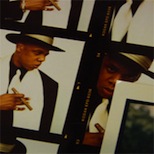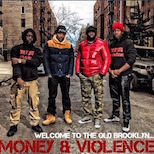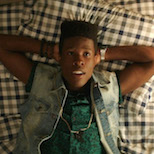The Minds Behind “Dear White People” Talk The Film, Race, And More
10.15.2014
LEISURE
When Justin Simien set out to write the script for Dear White People, he may not have immediately realized that his creation may serve as this generation’s Do The Right Thing as his film tackles the subject of racial identity and the relationships between African Americans and white Americans unlike any other film before it.
Set on a fictional Ivy League campus, Dear White People is a satirical look at the so-called “black experience” in a predominantly white setting. With four vastly different black leads navigating between who they are and who they are supposed to be, Dear White People will make you laugh it it’s blunt humor but also sets the table for a numerous conversations set around the film’s themes.
Life+Times caught up Simien and producer Lena Waithe along with cast members Tessa Thompson (Samantha White) and Teyonah Parris (Colandrea “Coco” Conners) to discuss what it means to negotiate one’s “blackness,” the complexities of racial identity in a supposed post-racial climate and why this film is as important as any other movie you’ll see this year.
Life+Times: Justin, how did Dear White People come to be?
Justin Simien: When I graduated film school in 2005, I found myself having a very different black experience than the one I saw on the screen. And the movies that I saw, studied and loved weren’t on the big screen. There was no Do The Right Thing, no Hollywood Shuffle or really even a Love Jones. For me, I wanted to talk about my experience of being a black face in a white place. I left Houston to come to Orange County for film school in a very white place. I found myself shucking and jiving a little bit to modulate the situation. That was an interesting thing to talk about and an interesting way to do an artful ensemble piece. It started with a script called 2% and eventually got to where it is now which is Dear White People. I took to Twitter to test out the lead character’s jokes to see how people would respond. We started to build an audience and then made a concept trailer that people responded to. That’s when I realized that this wasn’t in my head and it was an experience people were having. The movie didn’t even exist yet. That was a year and a half ago. Eventually we found a financer and made the movie.
L+T: Could this movie have been made 20 years ago when the topic of race was a bit more taboo?
Tessa Thompson: I don’t think we could have made this movie because this movie was about the space that we live in. The millennials. We could have made a similar film though.
L+T: Would the title have been accepted in 1994 rather than 2014? In 1994 we had Menace II Society and Boyz N Da Hood but I’m not sure we could have Dear White People.
J: I don’t know. That’s a good question. With those films you named people were really into black culture and gangster culture. This movie doesn’t even deal with that aspect of culture at all. It didn’t even reflect my black experience but that was what being black meant. It meant having braids and walking a certain way.
T: We live in a time that’s very nebulous. We’re in a space where we aren’t clear anymore with what we should do. I remember being in high school where I felt at least a little clear on what it meant to be black. Like listening to Wu-Tang or something. There was a vague road map. There was a moment when I come to Reggie, who was my black beacon in the movie. For Sam White he was the thing that encompassed everything that it meant to be black. He was like my Malcolm. Sam White is a person who modulates. We’re all over the place now as people.
L+T: Was the evolution of Sam White’s character predetermined or did that evolve with the script?
J: It evolved with the script. I knew the archetype of Samantha from the beginning. I wanted a revolutionary character. But in the beginning she was a cardboard cutout who just said things. I wanted somebody’s identity to identify only part of who they were. I think black people have pressure to live up their identity and that’s unique to the black experience. I didn’t want anybody to end like you think they would.
L+T: I want to move on to Coco. There’s always one person who refuses to identify with who they are. Was Coco always a part of the film?
J: Yes. But she was very different. She owned her hoodness in the first iterations. Her and Sam got into it. Their definitions of blackness clashed but when the film evolved into an Ivy League setting I wondered how this would work. That’s when Coco really twisted up inside. In many ways, she’s the most authentic. Even though we find her questionable, she knows who she is, why she’s doing what she does and she doesn’t have any fucks to give about it. She does things that we all do. We all use our blackness to get into places and will discard it as well.
Teyonah Parris: I saw the concept trailer first and got excited. I had just meant Lena Waithe and she suggested I audition for the part of Coco. I read the script and realized that she had a lot happening. She doesn’t always make the right decision and her ambition and will to get what she wants is not for everybody. I thought it was fun to explore that mindset. Why do you want to be famous? I had a moment in makeup when darker people were getting makeup put on that was four shades lighter and to my other side there were people being put blackface for this party. I became overwhelmed because I realized that there are women just like this who put on make up that’s lighter, wear lighter contacts and this really is the way they think they are beautiful and will be accepted. I was overwhelmed but happy to put this on the screen for people to see because this is how people navigate this world.
L+T: Justin, I understand that the character of Lionel, who happens to be both black and gay, is one that you personally identify with.
Justin: Yeah. The conflict between a black and gay identity on top of figuring out who you are as a person is intense. Black manhood, at least how I grew up, could never be synonymous with being gay. My story is that I entered college as Lionel and left as Sam. I didn’t necessarily feel a kindred spirit with the gay folk on campus. What Tyler James Williams did was that he didn’t play Lionel as a doormat or “over-gay” him. I was a gay black man but in college and people did not know what box to put me in. Like Lionel, I didn’t need to hang my hat on an identity. Lionel is the character with no identity at the beginning and that’s the thing he has to stand by. Tyler was able to play that to a T.
L+T: There’s also the overachiever Troy who is in stark contrast to who Lionel is.
J: With Troy, played by Brandon Bell, I wanted to talk about the pressure of being a black man when there are high expectations for you from your family. It’s like the talented tenth thing where you always have to work twice as hard to be better. I personally could never live up to that so I wanted to talk about that. It’s really hard to be perfect every time you walk into a room. It’s the question we’ve been asking ourselves since the Harlem Renaissance: Is it better to be ourselves and tell the truth or is it better to look and seem perfect?
L+T: This movie is unlike anything we have seen recently in Black cinema, why is that?
Lena Waithe: What’s so scary about black films is that it has become so mindless. It’s like a living Essence magazine where you put two big names on the marquee and it does well. But you can’t just sit in the back of a theater and watch black people behave. Justin is holding a mirror up to us. The industry doesn’t know what to do with you when you’re in the middle. You’re either Precious or you’re 12 Years A Slave. But the middle class is being ignored. The industry tells us that we don’t exist. Justin acknowledges our presence.
J: There are a lot of films where you are completely challenged by that filmmaker. But when all of those films are white, that says our audience can’t comprehend those stories. It’s not saying it overtly but it’s a subtle cultural queue.
L: Hollywood copies things so I look forward to the movie being a huge success but the following day at those meetings when they say “Oh, how do we get a smart intelligent film about people of color that isn’t painted with broad strokes?” That’s what is so exciting and keeps the conversation going.
L+T: Why should people see this film?
J: I’m going to make the impassioned plea because I see a lot of people are buzzing about the film. We are so excited and then we don’t support the movie. It’s so rare that a film like this has gotten through and if people want to see more of this, the only way it’s going to happen is if you support. Nothing is made in this industry if it hasn’t made money in the last year. The ability to get a black story told that’s not about slavery or a romantic comedy is virtually impossible to do. If audiences want to see themselves, they have to support. None of this lines my pockets and I’ve sold my soul a thousand times to make it but it certainly helps the filmmaker behind me to make a better film and get it through the system.





